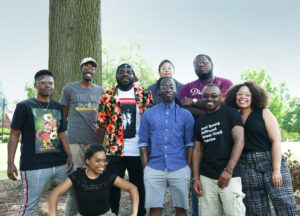
The first time I spent at Hurston/Wright was during the summer writer’s workshop in 2015, while I tried to pull together my first book of poems. I was still a young poet, still fairly new to writing, and still feeling a bit lost and struggling to find not only community, but a place where my work could be read among other Black writers, who understood the attempts I was making to situate myself in a world that had no desire to be explained. It was a week that I walked out of not only with a clearer understanding of what I was attempting to do as a writer and in my book, but also with a significantly clearer understanding of my capabilities and the richness of a space where Black writing and writers were cared for.
I have returned to Hurston/Wright multiple times as an instructor for that same writer’s workshop, in the hopes that I can pay forward some of the goodness that was shown to me during my time as a student. And in my return, I have been fortunate enough to teach and learn from groups of brilliant Black writers, spanning generations and geographies, all doing challenging work that is pushing the genre forward. In 2019, it was in a Hurston/Wright workshop, on the campus of Howard University, where I heard the news of Toni Morrison’s passing. And what a gift it was, to be able to share in mourning, to be held by a group of Black writers who loved Ms. Morrison, doing work in a place Ms. Morrison loved. This is an enduring memory for me. That day, I stepped back out into the world outside of Howard and was stunned by how so many people seemed to be going about life as usual, while just moments ago, a classroom of writers were weeping, holding each other, sharing memories about the first Toni Morrison book they read.
This is to say that places and organizations like Hurston/Wright are much needed. The list of reasons for this are long, but the one that I continually settle on is that there is a comfort within the walls of a Hurston/Wright space. Be it a gathering of teaching, or a reading, or a talk. There is something offered in the space that differs from the outside world, which may not always be as generous to Black people, Black thinkers, and Black writers. For this, I am in support of Hurston/Wright having the resources needed to not only sustain in the immediate moment, but also to flourish in the future. To continue to build a path for Black writers of all backgrounds. Ones, like me, who didn’t get the MFA or didn’t study writing in college. Ones who just fell in love with language, and followed it wherever it took them. This is a vital institution that it committed to the future of Black letters, and I am in full support of their work.
With thanks,
Hanif Abdurraqib

